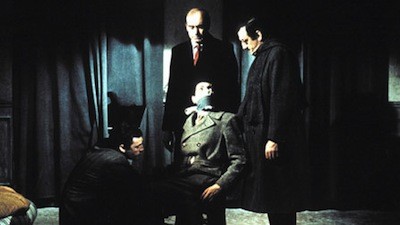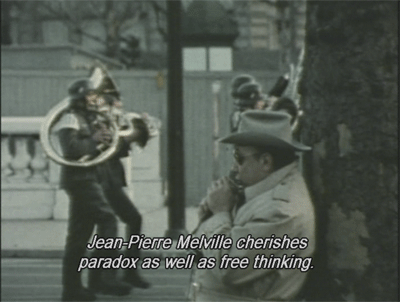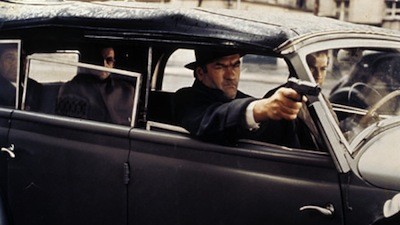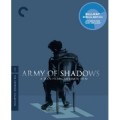| Reviews & Columns |
|
Reviews DVD TV on DVD Blu-ray 4K UHD International DVDs In Theaters Reviews by Studio Video Games Features Collector Series DVDs Easter Egg Database Interviews DVD Talk Radio Feature Articles Columns Anime Talk DVD Savant Horror DVDs The M.O.D. Squad Art House HD Talk Silent DVD
|
DVD Talk Forum |
|
|
| Resources |
|
DVD Price Search Customer Service #'s RCE Info Links |
|
Columns
|
|
|
Army of Shadows - Criterion Collection
THE MOVIE:
"I'd like viewers to come away from my films unsure whether they've understood them." - Jean-Pierre Melville

The reward of watching movies multiple times is being able to approach the material from different angles. This is my third format for seeing Jean-Pierre Melville's Army of Shadows--I first saw it in its theatrical re-release, then on DVD (my original thoughts are here), and now Blu-Ray--and this time, when I was watching, I paid attention to what a spooky movie Army of Shadows can be. That title, referring to the men who led the French Resistance in WWII, evokes the image of a spectral force, and the world Melville creates for them to go through is akin to a haunted realm, the place of the undead. It's moody and gray, quiet. We visit prison camps, occupied hotels, seaside hideaways, and in each place, normal life doesn't appear to be carrying on as always. The streets lack vibrancy, glimpses of the way things were are fleeting and far away.
And in this wartime limbo, the freedom fighters operate as a separate society, a hidden military. They work in secret, though their actions eventually go public. They seem to move in between the moments in which the rest go about their business--the rest being either their enemy or the citizens they hope to liberate. They are shades. They are other. Their multiple voiceovers speak in past tense, voices from beyond the grave.
Made in 1969, Army of Shadows is the story of the heroic struggle against the Nazis, who occupied France through most of the war. Lino Ventura (Touchez pas au grisbi) plays Philippe Gerbier, one of the main players in this underground revolution. At the start of the movie, he's being taken to a camp for political undesirables. He is driven through rain, out to a remote locale, far from the world. One could argue this is the point where he is separated from reality as it had been known. He is sent to the limbo that precedes limbo, the waiting room for the halfway point. He plots an escape, but before he can make his break, his number is called and he's taken back to the city. Once he is among the SS, he slips always is if he were never really there. The spook has returned to his haunted country.
What follows is a series of "incidents" and "missions." Philippe gathers his troops. Amusingly, it's almost like a manicured Hollywood war team--a brute, a young man, an old man, a handsome guy, a woman who really has it together. They engage in a somber combat, their actions almost imperceptible. There is the gut-clenching pain of having to kill a traitor by hand, and the delivery of supplies through tightly guarded checkpoints, and even a trip to England to try to garner support. There the otherness is even reinforced: during an air raid, Philippe stumbles into a nightclub where British soldiers are dancing. The revelers don't even notice he is there. They barely notice the bombing. They have found an oasis from the war. This is another world: Philippe and his "Chief" (Paul Meurisse) go to see Gone With the Wind. To the boss, a signal that the war is over will be when his countrymen can also experience this cinema--itself another story of struggle and division (though about as far afield of Army of Shadows in terms of tone and style as you're likely to find).
Melville plays with distance throughout Army of Shadows. Not only is the commonplace now far away, but these people who are working together are also separate, working under fake names, avoiding sharing details of their past lives. He creates formal compositions to mirror the exactitude of their planning. He foregrounds and backgrounds characters on the screen to indicate their current mood. For instance, when Jean-Francois (Jean-Pierre Cassel) decides to distance himself further, Melville puts him in the extreme foreground, away from the rest. The camera eye probes scenes, such as in the prison when Philippe passes around his cigarettes, and director of photography Pierre Lhomme circles with the packet, watching its journey. Melville also concocts an ironic ruse, showing Philippe working out of a talent agency, using theatrics as a front. All of these resistance fighters are performers themselves, they all have distinct roles to play.
Army of Shadows is essentially an espionage picture. It's not a war movie, even though it does involve the war. Rather, this is about the often unsung heroes, the ones who never got their due, who slowly pushed the rock up the mountain to try to make a difference. It's about tough choices and careful maneuvers. The narrative is multi-layered, complex to the point of abstraction. It's not an A to B to C plot in that each sequence suggests the next. Instead, Melville, who wrote the script from a novel by Joseph Kessel, focuses on the unexpected, the developments no one planned for.
Fittingly, then, it's the everyday things that cause the most trouble. For instance, Mathilde (played by the great Simone Signoret) runs afoul of the Nazis because of a photo of her daughter she refuses to discard. Philippe also gets arrested because he's found having a meal in a restaurant that serves black market meat. It's almost like he forgot that this kind of place, sitting with others and having a meal, isn't for him anymore. It leads to Army of Shadow's most existential moment, where Philippe goes against his own self-belief and must question why everyone else knew what he would do better than he did. The Nazi guards at the prison cruelly line up their prisoners and tell them to run. If they can outrun the bullets, they will live to race death again. Philippe tells himself he will not go, but something else takes over. Fear? A survival instinct? Or maybe fate...?
Francois also makes an existential choice in the movie, but he does it in secret. He doesn't even tell his comrades. He lets himself get captured, and they think he's run off. It's a perfect example of the kind of heroism I've been trying to describe. Doing what you think is right for you, and for no other reward but being true to yourself. It's an act born of alienation, but turning that lonely dread to positive action, the kind of ideal existential expression that is often glossed over by those who misunderstand the philosophy. In Philippe's moment of crisis, Melville cuts away from him and shows the actual shadows passing on the wall, the flickering figures of the titular army. One could bring up Plato's Cave, or even return to the theatricality and the whole concept of "shadowplay." Instead, I think this brief image is as straightforward in its symbolism as it seems: our experience is fleeting and difficult, but if we stand away and look at the outline of who we are, we can truly see ourselves. The true army of shadows is the congress of man, inconsequential and disconnected, but marching forward nonetheless.
THE DVD
Video:
Criterion's 2007 DVD of Army of Shadows was one of their strongest entries in the SD format, earning high marks from me back when it was released. I'm pleased that the new HD transfer of the 2004 restoration actually improves somewhat on the original release. The changes are subtle, but they manifest in the clarity of detail and the rendering of the colors. This is a very soft movie, taking place in perpetually cloudy weather. The dour grays and blues and the hazy pallor that hangs over everything is chillier here. I wouldn't call it more pronounced, that seems counter-intuitive, but it does have a stronger overall emotional atmosphere.
You can really notice it in the scenes of nature. The opening shots of the rainstorm are striking for how much rain we see, whereas the nighttime escape on the beach later on reveals all sorts of color gradients in the water and the sky. There is more nuance to both surfaces, and our eyes can now track the changes. Later, walks in the park give us nice greens. The actors also benefit, with skin tones and the lines on their face bringing their expressions to the fore, an important thing in a movie where so much occurs in silence.
Sound:
The original mono soundtrack is presented here in an uncompressed format, while there is also a second choice of stereo mix in DTS. I moved back and forth between them and didn't notice too much difference, though at times the stereo actually did sound more open, like there was a defined space between the two channels.
The optional subtitles match the original release, and they are very good.

Extras:
The extras for the BD edition of Army of Shadows matches the supplemental section of the 2007 DVD edition, though now included on one disc rather than two. I am essentially cutting and pasting my impressions of them from my old review to here:
The Army of Shadows - Criterion Collection Blu-Ray leads with an audio commentary by film historian Ginette Vincendeau, who has written a book about Melville. Her discussion is extremely detailed. She draws the lines between fact and fiction, both as it applies to the film itself and the novel it is based on. She also gives us background on the people in the movie, including the actuality of Melville's own time as part of the French resistance.
The separate extras:
* Trailers: the original French, artfully edited and narrated by Melville, and the 2006 US version.
* A short interview with Melville from French TV during the shooting of Army of Shadows, including on-set footage. (4:20)
* A new interview with Pierre Lhomme (14:07) where he talks about working with Melville, including the improvisation of certain effects so the young cinematographer could achieve what the seasoned director wanted. He also goes into some of the challenges of trying to restore the unique color palette Melville had intended for the film. This is followed by a separate 7-minute restoration demonstration put together by Lhomme, showing multiple comparisons of image resolution, some of the tears and cracks in the prints that had to be repaired, and a step-by-step recreation of 140 frames missing from the opening scene. There is also a stills gallery of color tests Melville and Lhomme did on the shoot, which were used as reference for the new transfer.
* An interview with editor Francoise Bonnot, whose mother edited many of Melville's other films. She has plenty of amusing anecdotes about the strange demands of a very demanding director. (10:56)
* Selections from a 1969 episode of the French television show L'invité du dimanche that focused on Melville. These excerpts deal directly with Army of Shadows, and in addition to on-set footage, include interviews with Melville, his cast, and the writer of the original novel, Joseph Kessel. It's a veritable treasure trove of material, and it's too neat a treat to see and hear film of the director being as meticulous and demanding as Lhomme and Bonnot told us he could be. About a third of the included program features André Dewavrin, the real liaison between England and France during the Occupation, who plays a version of himself in Army of Shadows. (30:17)
* Melville et "L'armée des Ombres" is a 2005 documentary (27:30) featuring Lhomme, Bonnot, Jean Pierre-Cassel, and composer Eric Demarsan, alongside filmmakers Philippe Labro and Bernard Tavernier, looking back at the history of Army of Shadows and its director. It's quite a tribute to the man, tinged with the irreverence and humor that only hindsight can bring. It's probably the best homage here, because it's the least reverential--which seems truer to Melville's spirit.
Finally, in a submenu titled "The Resistance," are three more extras:
* Le journal de la Résistance, a 1944 propaganda documentary from the real front lines of the Occupation. It's narrated by Noel Coward and is part of the collection put together by the Imperial War Museum. Most of the footage is from the final days of the liberation of Paris, and some of it is quite gruesome. (34:00)
* "Simone Signoret and Lucie Aubrac," a montage of interviews from 1984 where the actress discusses the character she played, which was partially based on Aubrac. In turn, Aubrac reflects on her feelings about being portrayed in movies and novels. (5:25)
* Pieces of a 1973 episode of Ouvrez les Guillemets where surviving members of the Resistance are interviewed and debate different viewpoints about how the movement was conducted and the relationship of France and England. (23:30)
The interior booklet for Army of Shadows - Criterion Collection has numerous essays about the film, including critical pieces by Amy Taubin and history professor Robert O. Paxton. The rest of the 44-page color booklet is filled out by photos and words from Melville himself, excerpted from the book Melville on Melville.
FINAL THOUGHTS:
DVD Talk Collector Series. It amazes me that Army of Shadows has remained in the shadows for so long. Never shown in America until 2006, Jean-Pierre Melville's iron-jawed, demystified eulogy of the French Resistance is both an honest time capsule of WWII and a timeless, almost surreal, existential parable. Rarely pausing to reflect on its own meaning, this string of stories about a band of fighters is nevertheless a philosophical and moral picture of action in a time of distress. Lovingly shot and meticulously edited, the Criterion Collection already did right by Army of Shadows three years ago, and their porting over their brilliantly restored and packed DVD to Blu-Ray manages to get it even more right. The set-up is the same, but it's just better enough to justify giving serious consideration to the upgrade.

Jamie S. Rich is a novelist and comic book writer. He is best known for his collaborations with Joelle Jones, including the hardboiled crime comic book You Have Killed Me, the challenging romance 12 Reasons Why I Love Her, and the 2007 prose novel Have You Seen the Horizon Lately?, for which Jones did the cover. All three were published by Oni Press. His most recent projects include the futuristic romance A Boy and a Girl with Natalie Nourigat; Archer Coe and the Thousand Natural Shocks, a loopy crime tale drawn by Dan Christensen; and the horror miniseries Madame Frankenstein, a collaboration with Megan Levens. Follow Rich's blog at Confessions123.com.
|
| Popular Reviews |
| Sponsored Links |
|
|
| Sponsored Links |
|
|
| Release List | Reviews | Shop | Newsletter | Forum | DVD Giveaways | Blu-Ray | Advertise |
|
Copyright 2024 DVDTalk.com All Rights Reserved. Legal Info, Privacy Policy, Terms of Use,
Manage Preferences,
Your Privacy Choices | |||||||













